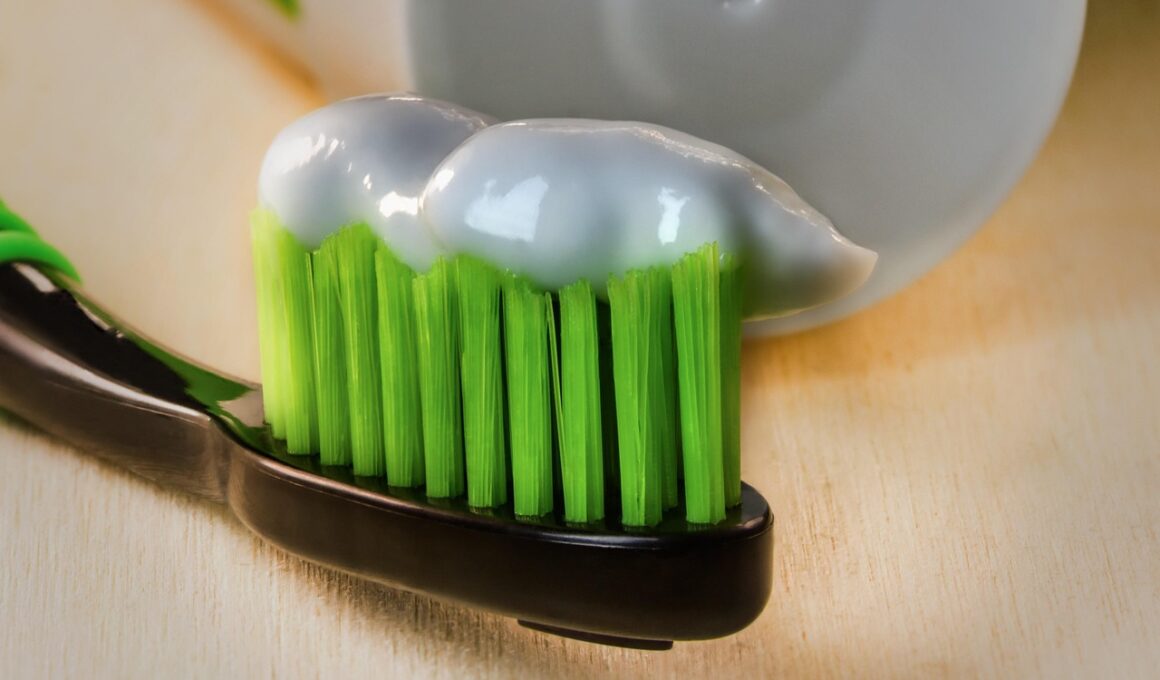How to Store and Maintain Dog Dental Hygiene Products
Proper storage and maintenance of dog dental hygiene products are crucial for their effectiveness and longevity. Ensure you store products such as toothpaste, brushes, and rinses in a cool, dry place, away from direct sunlight. Exposure to heat or moisture can compromise the integrity of these items, leading to reduced efficacy. Keeping items organized in a designated pet care cabinet or drawer can help in routine accessibility. Consider using labeled containers to separate different products for easy identification. Regularly check the expiration dates on dental products and discard any that are no longer valid. Always clean brushes and tools after use to prevent the buildup of bacteria. Rinse them thoroughly with warm water and allow them to air dry completely before storing. Additionally, having a dedicated dental hygiene routine can be beneficial for your dog’s oral health. This includes brushing their teeth at least two to three times a week while utilizing dental chews or toys designed to promote dental hygiene. Regular vet check-ups are also essential to monitor your pet’s dental health effectively.
Another fundamental aspect of maintaining dog dental hygiene products involves selecting the right products suitable for your pet’s size and breed. Not every dog will benefit from the same products. Consult your veterinarian to determine the best dental care solutions for your furry friend. Dental rinses, sprays, or specialized chews can be valuable supplements to standard brushing regimens. When introducing new products, observe your dog’s reaction and adjust as necessary, ensuring they’re comfortable. Store liquid products upright to avoid leaks and secure caps tightly after each use. For edible dental hygiene products, keep them in sealed containers to maintain freshness and prevent contamination. Effective organization is essential; consider a pet hygiene box or basket dedicated to dental care items. Include a reminder note for regular usage schedules if needed. Additionally, be sure to rotate products to keep your dog’s dental hygiene routine engaging and avoid monotony. Dog dental health is crucial, as periodontal disease can lead to significant health issues, including heart disease, if not addressed properly. Ensuring you store and maintain dental products allows you to commit to your pet’s overall well-being.
The frequency of maintenance for dog dental hygiene products varies based on the item type. For instance, toothbrushes should be replaced every three months or sooner if bristles appear worn. Conversely, dental wipes can spoil more quickly, demanding that these be monitored each time you access them. Designate a specific shelf in your pantry or linen closet for all dental hygiene necessities, where they can be stored safely yet remain accessible. Furthermore, develop a maintenance checklist to ensure nothing falls through the cracks in your dental regimen with your dog. Another key factor is ensuring correct usage of all products, as many items have specific instructions that help maximize their effectiveness. Always follow the guidelines provided by manufacturers on the packaging. If you’re unsure of how to proceed, don’t hesitate to consult a veterinarian. Not all dogs will have the same dental care needs, making professional guidance essential in determining the appropriate routine to maintain optimal dental health. Your dog’s comfort is key when establishing a dental hygiene routine, so implement practices that enforce positive experiences.
Creating a Regular Dental Hygiene Schedule
Establishing a consistent schedule for dog dental hygiene can aid in creating a habit that ensures ongoing oral health. Designate specific days for brushing your dog’s teeth and stick to them. This helps create predictability for your dog, providing comfort and reducing anxiety related to dental maintenance. Consider incorporating dental activities into your pet’s routine to make it a joyful experience. Use positive reinforcement by rewarding your dog with treats and affection after each successful brushing session or dental care activity. Additionally, consider choosing a time of day that aligns with your dog’s energy levels, ideally when your pet is calm and relaxed. Creating a ritual, such as dental hygiene after meals, can make the task easier for both you and your dog since they are more accustomed to a structured routine. Make sure to incorporate the usage of dental toys throughout the week that help clean teeth while providing entertainment as well. Combining various dental hygiene products and approaches keeps your dog engaged, which aids in developing a long-lasting positive association with dental care.
Another vital consideration regarding the maintenance of dental hygiene products is understanding the importance of product compatibility with your dog’s unique characteristics. For example, some dogs may have allergies or sensitivities that affect the types of dental products you can use safely. Therefore, read the ingredient lists carefully when selecting dental chews, pastes, or rinses. Discuss these factors with your veterinarian if you have any concerns about certain components. In addition to product compatibility, you should take care to introduce new dental products to your dog gradually. Monitor for any adverse reactions, and if you notice discomfort or negative side effects, discontinue use immediately. Never compromise on quality over cost when purchasing dental hygiene products. Investing in reputable, vet-recommended brands will yield better long-term outcomes for your dog’s dental hygiene. Also, make sure that you’re aware of the correct technique for using each product. This ensures you attain satisfactory results without risking harm to your dog’s gums or teeth, which can cause significant discomfort. Educating yourself about dog dental care and involving your pet in the process enhances the experience for both parties.
Storing Dental Hygiene Products Safely
Storing dog dental hygiene products safely plays an important role in maintaining their effectiveness. Place products out of reach of children or other pets to prevent accidental ingestion or misuse. Use childproof containers when appropriate, especially for products containing potentially harmful ingredients. Preventing accidental access not only safeguards your dog but also protects the overall integrity of the products. Avoid storing dental hygiene items in bathrooms where high humidity can diminish quality or effectiveness. Instead, reserve these items for a climate-controlled environment. Additionally, consider taking time to organize dental hygiene products individually or collectively for easy access. When conditioning your pet’s dental hygiene, ease of access can make a significant difference in consistency. Assess your storage regularly to ensure it remains effective and tidy. Replace and replenish any products that have been used up or expired and update stock as necessary. As time progresses, learn which items work best for your dog’s dental care and position those for quick retrieval when needed. Educating your family members about the proper storage and handling of these products can also ensure a collective responsibility in your pet’s care.
Finally, regular cleaning of the storage area where dental hygiene products are kept is critical. This helps prevent contamination and ensures that you’re not inadvertently using expired or damaged products. Wipe down shelves regularly with a disinfectant to maintain a sanitary environment. Just as you would with human dental care, ensure that dog dental hygiene tools are kept clean. Moreover, periodically monitor the effectiveness of various products you are using and discuss them with your vet to evaluate their impact on your dog’s health. Understanding your dog’s response to specific products allows for a tailored approach to their dental care. It’s important to recognize that dental health can significantly affect your dog’s overall well-being. Consistent care can help to avoid dental diseases that might otherwise lead to more severe health concerns. Therefore, the maintenance of dog dental hygiene products extends beyond mere storage; it signifies a commitment to your furry friend’s health. Healthier teeth mean a happier and more vibrant pet. Consider gathering resources and support from fellow dog owners, forums, or canine dental health experts to continually enhance your approach.


